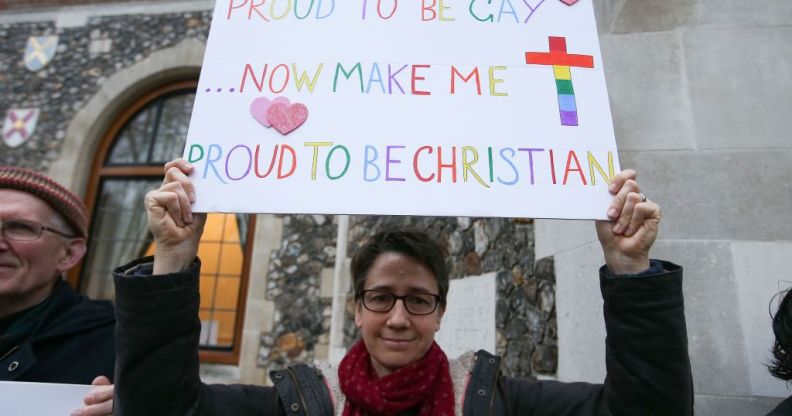Church of England election candidates told to discuss threesomes when grilled on LGBT+ inclusion

Demonstrators hold placards as they protest outside Church House, the venue of the Church of England’s General Synod, in 2017. (AFP/ Getty/ DANIEL LEAL-OLIVAS)
Evangelical candidates for upcoming Church of England elections are being encouraged to discuss threesomes when asked about diversity and LGBT+ inclusion.
2021 is an election year for the General Synod, the legislative body of the Church of England, and campaigning by candidates is underway.
One of the major issues candidates are expected to discuss is that of LGBT+ inclusion, including same-sex marriage and the blessing of same-sex unions in the church.
An Evangelical group within the Church of England has advised its members to deflect from the issue in order to win elections.
According to its “basis of faith“, the Evangelical Group of the General Synod (EGGS) believes in “the unchangeable standard of Christian marriage between one man and one woman as the proper place for sexual intimacy and the basis of the family”.
It adds: “We repent of our failures to maintain this standard and call for a renewed commitment to lifelong fidelity in marriage and abstinence for those who are not married.”
Ahead of the General Synod elections, EGGS released a guidance document for Evangelical candidates.
The document, alongside advice on including “a good, smiling photo” and considering “the use of tables, columns, bullet points”, instructs candidates: “Don’t focus on controversial matters such as: Same-sex relationships/ marriage, transgender etc, women priests/ bishops, abuse within the church.”
It adds: “The issue of human sexuality is obviously important – but you need to take a view as to whether it’s helpful to reference this in your statement or not. It might be that it is wiser not referred to.
“As an alternative – it might be helpful to talk about listening positively to and respecting the views of others, even when we find ourselves disagreeing.”
Any creedal church is not committed to diversity in all forms.
In a second document, which provides guidance for hustings, EGGS lays out a script for answering questions about the aforementioned “controversial matters”.
It gives an example response for candidates to use when questioned on whether the church should embrace all kinds of diversity, including LGBT+ people.
It reads: “This is not the question it pretends to be.
“In actual fact – any creedal church is not committed to diversity in all forms – because our creed has theological ‘boundaries’ that do not allow some forms of theological diversity.
“And if you want an ethical example – the church does not permit/bless threesomes in a cohabiting relationship.
“So the answer to the question has to be ‘no’. The real question is how does the church decide where its ‘boundaries’ are.”
When asked about abuse by Church of England evangelicals, candidates are encouraged to say: “Where evangelicals have been abusive we must call it out, repent and address the issues raised.
“But it’s not just Evangelicals who have abused others – its Catholics and people of other faiths and people of no faith.”
LGBT-inclusive Anglicans insist the tactic won’t work: ‘Silence can also speak volumes’
Sharing the documents on Facebook, Reverend Canon Simon Butler wrote: “In case you’re going to a General Synod Hustings in the coming weeks and want to ask candidates about matters like women’s ministry or LGBT+ inclusion, you might be interested to know that the Evangelical Group of General Synod has produced a crib sheet of ‘the party line’ to aid their candidates.
“It trots out some old canards that those familiar with approaches taken in previous elections will have seen before (‘I’m a supporter of women’s ministry’ hiding opposition to women in leadership) and a new one – you can’t bless threesomes so you can’t bless faithful LGBT+ relationships.”
Last year, the Church of England published a a set of resources titled Living in Love and Faith (LLF), exploring LGBT+ issues including “identity, sexuality, relationships and marriage”.
In 2022, the LLF Next Steps group said that “the materials will move to discernment, decision-making and if necessary, synodical processes”.
Butler added that the documents from evangelicals in the Church of England “reveal to me how little the leadership of the EGGS group have learned through Living in Love and Faith“.
Phil Gardner, a member of the The Campaign for Equal Marriage in the Church of England, added: “The overall impression of the document is that candidates should pretend to be much more ‘moderate Anglican’ than they actually are… For those of us who are electors to General Synod: let’s ask the candidates some really clear, precise questions about matters that concern us.
“They don’t have to answer them, but fudging or silence can also speak volumes. And let’s not get diverted by mention of ‘threesomes’!”
The General Synod is the legislative body of the Church of England, and it is split into three houses. The House of Bishops, the Synod’s upper house, is not elected, and is made up of all Church of England bishops.
Elections for the other houses – the House of Clergy and House of Laity – are held every five years.
PinkNews contacted the Evangelical Group of the General Synod for comment.

